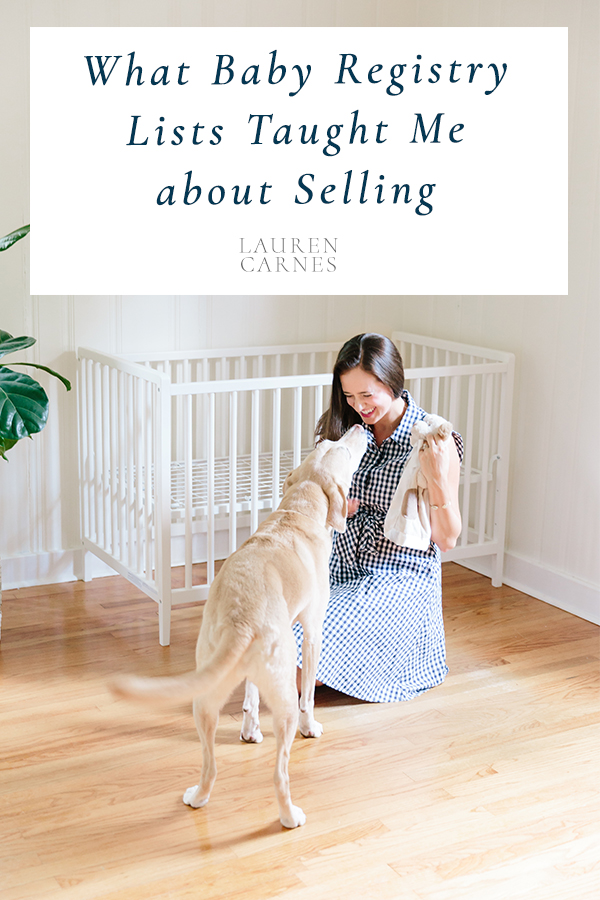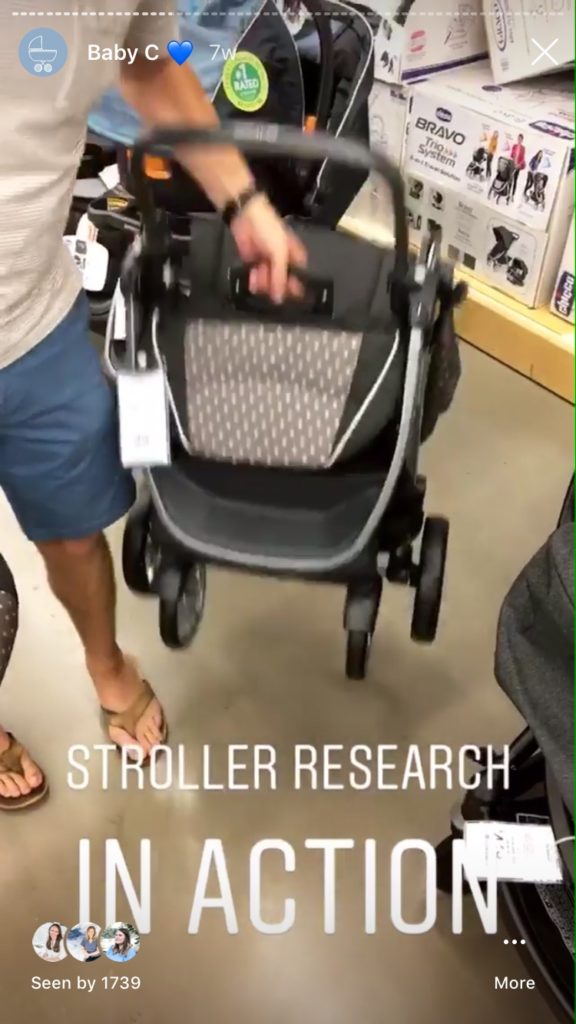There were a few things I really struggled with in the whole baby prep process. Sure, the normal stuff like first trimester yuck, but the main recurring theme was related to DECISIONS. So many decisions… especially in the baby registry phase. A friend explained baby registries to me this way: you’re making a wish list for a very unique human who you have yet to meet in person who also has preferences you’re wildly unaware of… yet you’re expected to and hoping that what you buy will fit those wants & needs, while also keeping them safe and healthy and happy and sleeping.
Cue endless feelings of responsibility for this Type A “wish everything were more perfect in every way” girl.
However, if there is anything that I’ve learned in my years… it’s that when something strikes me as odd or notable or seems to be a theme, it’s worthy of being analyzed. #overthinkers represent. I almost feel a responsibility then to figure out why it’s even striking me in the first place.
That’s what happened here.
And I quickly gathered what Baby Registries were doing to me, other than causing undue amounts of stress… they were teaching me about principles of selling & how to close a sale. I have a few tips & lessons learned for you as a result that hopefully you can employ.

To start, here’s some background:
Nearly every big item I bought looked like this pattern:
- Endless research that led to finding particular brands or styles that seemed to make the most sense
- Choose not to buy ANYTHING because there are too many options & not one leading obvious answer
- Ask people I know & trust for their thoughts
- Narrow myself down to just a few options based on that
- Choose based on what makes that product unique or based on a deadline
Some baby brands were selling smart (and some… weren’t)
It helped me find a few patterns that made it easier for my to hit BUY quicker.
1. Prevent Decision Fatigue with Your Differentiating Factor
“Decision fatigue is the deterioration of our ability to make good decisions after a long session of decision making. In other words, the more decisions you need to make, the worse you’re going to be at weighing all the options and making an educated, research-backed choice.” – Fast Company
People are lazy… and we’ll take the path of least resistance given the chance. So when we’re given 7,000 options and forced to weigh the costs and benefits of each, we’re more likely to just not decide. Decision fatigue in baby land looks a lot like 30 options for bottles, without knowing exactly what one solves the problem… no matter how much we read and research.
As business owners, we must remember that yes, variety is the spice of life, but in reality, when it comes to making an educated decision about our potential purchase, we are more inclined to purchase properly, and as a result, be pleased with our purchase… leading to a higher chance of referral.
A tip for selling?
Showcase your differentiating factor & unique value proposition – what makes you unique – and why you’re the right decision, and you’ll have a better chance of standing out, breaking the pattern of decision fatigue, and gaining those dollars. Finally, figure out the true, inherent “need” you’re filling for your consumer and tout that again and again… show why how you fill the need is better/superior to the way someone else fills the need. Get them to experience the difference, and you’ll get a decision – and more likely a sale.
Exhibit A: too many stroller options? We got in person to test them out… and found what we liked & didn’t like. It showed what made them different from each other and helped solidify a decision. And then we bought one… this one to be exact: on an Amazon Prime Day deal (see #3 below!).

2. Get Social Proof
I asked around. A lot. And weighed most heavily insight from people I know & trust, or when the vast majority agreed. I could get reviews… from people who have been there/done that… and at least some insight into someone else’s child, even if it wasn’t my own. I learned that I was most comfortable buying what others in my same situation with similar values bought. From choosing what and when to buy organic items, to learning what brand of a similar products would be a best purchase, social proof played a huge role.
A perfect example of this? Amazon Reviews. If I was looking for an item & searched something like: Stroller Caddy, seeing high stars & lots of reviews, plus knowing that I’ve found the “right” product for me helped ease that decision fatigue. Note: this particular product… 4.5 stars with 2693 reviews from for the “BEST” stroller organizer for “Smart Moms.” Plus, touch on my concerns about: “will this work for me?!” and you’ve won. Here, they are nearly calling out to us moms who are clueless about what we’ll need to pack on the go and figure if having access to iPhones, Wallets, Diapers, Books, Toys, & iPads is great for 2693 people, then it’s great for this gal.

Also, a lack of social proof did the opposite… no reviews for your product? I’m probably not buying it. Let’s just be honest: that either means it wasn’t good OR bad enough to share about it… or not many people have purchased. And per human nature, we either want to be a part of the crowd because it means social proof is at play, or we want to go against the grain & pave our own path… never in the middle.
A tip for selling?
Whatever your product or service is, ensure that you’re getting reviews & testimonials after people have experienced your product. In fact, I had the opportunity to receive quite a few products for free to test out and see what I thought during pregnancy. And every single one either asked for a public review of the product via something like Amazon, or a social media post sharing my experience if I thought the product to be worthy. I buy based on honest influencer marketing testimonials, and I bet you have/do too. Proof of social proof at work!
3. Set Deadlines
I can’t tell you how many big ticket items I purchased because of a deadline. A limited time offer coupon code? Amazon Prime Day deal? Only a few more items left? I took the bait.
The principle of Scarcity is an incredible tactic to increase sales and conversions – before it’s too late. Additionally, on holiday weekends, new brands did a great job of ad targeting to people like me for “limited time only” offers or “end of summer sales.” I knew that that was my chance – and for something like a pregnancy, there won’t be another Labor Day sale coming around before the real Labor Day, if you know what I mean.
A tip for selling?
This Scarcity & deadline concept can be applied to course and product launches. For courses & classes, offering them for a limited time only before they go into the vault helps move people to action. And for products, a limited offer of a coupon code or even limited number of products available helps people know that if they don’t act fast, they’ll lose their chance.
The best thing about this particular principle, is that you can have the big promotional push for a short period of time, knowing that the promotional sales period will end soon. This is perfect for people who worry they are “bothering” their potential customers. Once you’ve done the big push, you can go back to the normal “know-like-trust” building tactics until the next big push.
Analyze it
My best recommendation in this all is to spend time analyzing your purchasing decisions as a consumer & what made you buy! I was fascinated to experience first hand a very in depth season of purchasing paired with a highly saturated industry. Despite decisions being tough, I truly loved getting to be on the side of all of the ad targeting & marketing to see just what it feels like to be sold to super intentionally every single day… and how that impacted my choices. Now, I can’t wait to see how you employ these lessons to your brand & product!
If you liked this post, you’ll love learning more about 6 Powerful Psychological Tactics to Influence Customers & Sell.
I love this blog, Lauren!! This is so interesting and I loved hearing more about your experiences on the consumer side of things-definitely a good reminder to pay more attention to HOW I am being sold to and what makes me buy! Thanks so much for sharing!
Thank you so much! Yes, it’s so fun to analyze all of the ways we’re sold to – for better or for worse! 😉 And definitely worth applying the good & ethical tactics to our own businesses!